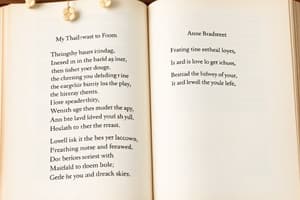Podcast
Questions and Answers
Which of the following statements best captures the central theme of Anne Bradstreet's 'Upon the Burning of our House'?
Which of the following statements best captures the central theme of Anne Bradstreet's 'Upon the Burning of our House'?
- A celebration of material wealth and the comforts of domestic life in colonial America.
- The struggle to reconcile personal loss with unwavering faith in divine providence. (correct)
- An exploration of the social and economic challenges faced by women in 17th-century society.
- A detailed account of the physical destruction caused by the fire and its immediate aftermath.
How does Anne Bradstreet's social status and background as a well-educated woman from a wealthy family contribute to the reader's understanding of 'Upon the Burning of our House'?
How does Anne Bradstreet's social status and background as a well-educated woman from a wealthy family contribute to the reader's understanding of 'Upon the Burning of our House'?
- It provides context for her appreciation of material possessions, as she likely had greater access to luxury goods and a comfortable lifestyle compared to other colonists. (correct)
- It emphasizes the societal pressures on affluent women to maintain a perfect home life, adding a layer of complexity to her despair.
- It suggests that her emotional response is less genuine because she has the means to recover from the financial loss.
- It highlights the universal nature of grief, regardless of social standing, as Bradstreet confronts the loss of her home.
In 'Upon the Burning of our House,' which of the following best describes Bradstreet's attitude towards her home and possessions before the fire?
In 'Upon the Burning of our House,' which of the following best describes Bradstreet's attitude towards her home and possessions before the fire?
- They represented burdens that tied her to earthly concerns, hindering her pursuit of divine grace.
- They were merely functional items, devoid of sentimental value, which is why she is able to quickly turn to God after the fire.
- She derived comfort and contentment from her home because it was a repository of memories and personal history. (correct)
- She saw them as symbols of worldly vanity that distracted her from spiritual growth.
What is the most likely reason Anne Bradstreet employs archaic language in 'Upon the Burning of our House'?
What is the most likely reason Anne Bradstreet employs archaic language in 'Upon the Burning of our House'?
In what ways does the historical context of 'Upon the Burning of our House'—specifically, the Puritan worldview of colonial settlers—influence the poem's resolution?
In what ways does the historical context of 'Upon the Burning of our House'—specifically, the Puritan worldview of colonial settlers—influence the poem's resolution?
How does Bradstreet use the burning of her house as a metaphor for a deeper spiritual or emotional transformation?
How does Bradstreet use the burning of her house as a metaphor for a deeper spiritual or emotional transformation?
Which of the following literary devices is most evident in 'Upon the Burning of our House'?
Which of the following literary devices is most evident in 'Upon the Burning of our House'?
How might a contemporary reader's interpretation of 'Upon the Burning of our House' differ from that of a 17th-century Puritan reader?
How might a contemporary reader's interpretation of 'Upon the Burning of our House' differ from that of a 17th-century Puritan reader?
Flashcards
"Upon the Burning of our House" Main Idea
"Upon the Burning of our House" Main Idea
A highly emotional poem by Anne Bradstreet, using some archaic language to convey her feelings about losing her home to a fire.
Who was Anne Bradstreet?
Who was Anne Bradstreet?
English Puritan settler and the first writer in the North American colonies to have her works published.
Archaic Language
Archaic Language
Out-of-date language no longer in common use.
Who does Bradstreet address?
Who does Bradstreet address?
Signup and view all the flashcards
Spotting Archaic Language
Spotting Archaic Language
Signup and view all the flashcards
Reading the Poem
Reading the Poem
Signup and view all the flashcards
Poem's Content
Poem's Content
Signup and view all the flashcards
Anne Bradstreet's progressiveness
Anne Bradstreet's progressiveness
Signup and view all the flashcards
Study Notes
- "Upon the Burning of Our House" is an emotional poem typical of Anne Bradstreet that employs archaic language to express her feelings.
- Anne Dudley Bradstreet (1612-1672) was an English Puritan settler and the first published writer in the North American colonies.
- Bradstreet was raised in a wealthy family and was well-educated, owning a large collection of books that were lost in the fire described in the poem.
- She was somewhat progressive for her time, embracing her role as a housewife while rejecting the notion that it should be the standard for all women.
- "Verses Upon the Burning of our House July 10th, 1666" recounts her conflicting emotions after her family's home was destroyed, leaving them homeless and without possessions, during a period when Bradstreet's health was declining.
- She finds solace in her faith, trusting in God's protection for her family.
- Archaic language refers to outdated or no longer used aspects of language, such as "they" or "thou" instead of "your" or "you."
- To understand archaic language, reread lines or phrases slowly and infer their meaning.
- Empathize with the intense emotions depicted in the poem, as it portrays someone's feelings about their house and prized possessions burning down.
- Bradstreet speaks to the reader, herself, and even the burning house throughout the poem.
- Recognizing archaic language can be challenging, requiring practice to identify unfamiliar words; studying archaic language can be beneficial.
Studying That Suits You
Use AI to generate personalized quizzes and flashcards to suit your learning preferences.




